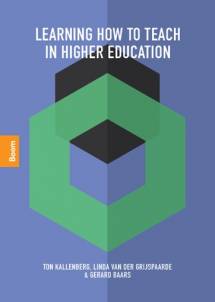Learning How to Teach in Higher Education focuses on the daily practice of teachers in higher education. Even though their role is changing, teachers are crucial for students. After all, it is up to the instructor to shape teaching in such a way that students achieve maximum learning outcomes.
Learning How to Teach in Higher Education is intended for beginning teachers in higher education, but it is also an excellent reference work for more experienced teachers who are looking for practical tips or a theoretical foundation.
The book covers four themes:
- How do students learn?
- What should students learn and how do they demonstrate it?
- How do students reach the desired final level?
- The evaluation and development of education.
The focus is on campus-based education; the interaction between teachers and students in a physical environment. There is also ample attention to online and/or blended forms of education. Using examples, diagrams, models and skills sheets, the authors provide direct support for questions from everyday teaching practice.
The book can be used in professionalization courses and learning paths for teachers, examiners, and student advisors in higher education, such as the Basic and Senior Teaching Qualification (BKO, BDB, SKO in Dutch), the Basic and Senior Qualification for Examiners (the BKE and SKE in Dutch), and the Basic and Senior Qualification for Study Advisers (the BKS and SKS in Dutch).
Introduction 13
Theme 1 How do students learn? 17
1 Learning, remembering, and learning activities 19
1.1 Why student learning? 19
1.2 Learning and remembering 19
1.3 Remembering and memory 23
1.4 Learning activities 26
2 Differences between students 31
2.1 Why differences between students? 31
2.2 Ability to manage learning 39
2.3 Ability to learn in depth 40
2.4 Learning styles 41
3 Teaching activities 51
3.1 Why teach? 51
3.2 Different functions of education 51
3.3 Relation between teaching functions and teaching activities 53
3.4 Cognitive teaching activities 55
3.5 Affective teaching activities 59
3.6 Regulatory teaching activities 61
3.7 Directing the learning process 65
3.8 Dealing with student differences 71
4 Increasing study success 75
4.1 Why increase study success? 75
4.2 The quality of the teacher 76
4.3 Characteristics of the training 80
Theme 2 What should students learn and how do they
demonstrate it? 107
5 Setting learning objectives 109
5.1 Why set learning objectives? 109
5.2 Coherence 110
5.3 What functions do learning objectives have? 112
5.4 What types of educational objectives can we distinguish? 113
5.5 Into which categories can we divide knowledge? 116
5.6 Into which categories can we divide skills? 118
5.7 What are the components of a concrete learning
objective? 125
6 Testing and assessment 129
6.1 Why test and assess? 129
6.2 Functions of testing and assessment 129
6.3 Choosing a test format 131
6.4 Forms of testing 137
6.5 Quality of testing and assessment 150
6.6 Requirements for an assessment 151
6.7 Developing a test 154
6.8 Digital tests 161
6.9 Preventing plagiarism 165
Theme 3 How do students reach the desired final level? 207
7 Didactic methods 209
7.1 What should you consider when selecting teaching methods? 209
7.2 The didactic educational concept of the programme 211
7.3 Teaching methods at the start of the unit of study 234
7.4 Teacher-driven teaching methods 236
7.5 Interactive teaching methods 251
7.6 Forms of assignment 258
7.7 Forms of play 266
7.8 Group work 267
8 Selecting material 271
8.1 Who selects the learning material (content)? 271
8.2 Content-oriented curriculum selection by the teacher: a structured approach 273
8.3 Assessing and using existing learning materials 280
8.4 Allowing students to search, select and evaluate the subject matter 284
9 Guiding students 287
9.1 Why supervise students? 287
9.2 Intensity and style of guidance 288
9.3 Giving feedback to students and receiving feedback from students 290
9.4 Coaching of students 295
9.5 Guiding students in specific educational activities 297
Theme 4 Evaluation and further development 369
10 Examining and improving the quality of education 371
10.1 Why collect information on the quality of education? 371
10.2 What information on the quality of education is important? 372
10.3 Students’ opinions as an indicator of the quality of education 374
10.4 Reflecting on your own performance 376
10.5 The evaluation process 382
10.6 Position in the system of (external) quality assurance 386
11 Continuous improvement of your education (innovating) 391
11.1 Why continuous improvement of your education? 391
11.2 The importance of teacher professionalisation 392
11.3 Forms of teacher professionalisation 396
11.4 Innovating your teaching 401
Literature 419
Index 429
About the authors 432
Docentprofessionalisering
Deze uitgave is bedoeld ter bevordering van de eigen professionalisering als docent. Voor deze titel is het niet mogelijk om een gratis beoordelingsexemplaar aan te vragen. Samen met je team dit boek lezen? Bij een bestelling vanaf 10 exemplaren is een korting mogelijk! Neem contact met ons op over de mogelijkheden.



